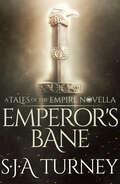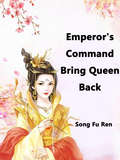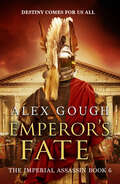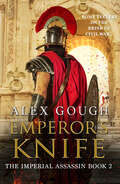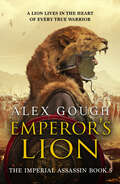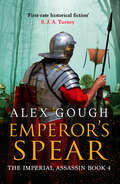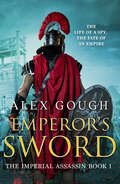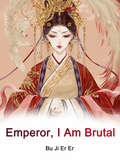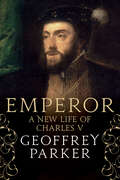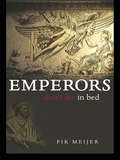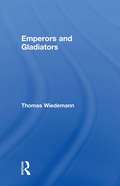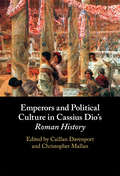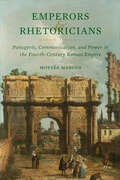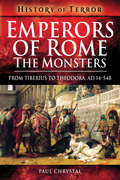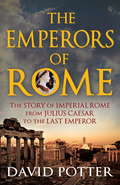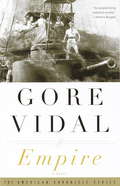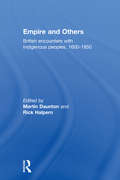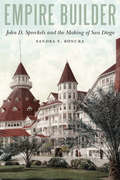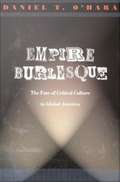- Table View
- List View
Emperor's Bane (Tales of the Empire)
by S.J.A. TurneyFrom barbarian slavery to conquest and treachery.For centuries, the Khmar have eked out a nomadic existence on the fringes of civilisation. Tenzhin is only a boy when his tribe strikes deep into the Jin Empire and faces the might of the Jade Emperor. After his father is killed before his eyes, he is plunged into a new world: ancient, courtly – and brutal.Adopted by the Emperor, the boy must forget his old life and learn to survive the challenges of life as a prince. Tenzhin must perfect his mind, his soul and finally his body, in order to prepare for what lies ahead. Allies are few and far between, and eventually he must face the biggest trial of them all…Emperor’s Bane is a novella set in the Tales of the Empire universe. A gritty tale based on the Mongolian invasions of imperial China, it will engross readers of Guy Gavriel Kay and Conn Iggulden.
Emperor's Command, Bring Queen Back: Volume 2 (Volume 2 #2)
by Song FuRenFive years ago, she had fallen from the sky and landed on a pretty boy.Five years later, he set up the largest mysterious organization in the capital with his son.A certain little girl said, "Mother, Prince An has come to propose and grant you the position of wangfei."A certain woman painted her nails as she waved her hand, saying, "If you want to marry me, first sell yourself to me."A certain little girl said, "Mother, Prince Chibang has come to propose marriage, allowing you half a mountain."The woman took a bite of her grape, her face expressionless.
Emperor's Fate (Imperial Assassin)
by Alex GoughMassacres, invasions, plots. An Emperor on the edge. An Empire in peril.Caracalla is on the warpath. Time, he has decided, to put his enemies in their place. To invade the Parthians at the edge of the Empire. To destroy everything in his way.For Imperial Assassin Silus, this is a time of crisis. Forced to guard the Emperor as part of his elite bodyguard, Silus knows that the situation is untenable. As everything threatens to crumble, Silus must make the ultimate choice… and face the ultimate sacrifice.The question is simple: will he turn traitor, for the sake of the Empire and the sake of his conscience? Or is loyalty, and the life of his charge Tituria, more important? As innocents die, as blood flows, as the Roman legions march on an epic scale, one thing is clear.It’s decision time.The thrilling climax to Alex Gough’s bestselling series, perfect for fans of Anthony Riches, Ben Kane and Bernard Cornwell.
Emperor's Knife (Imperial Assassin)
by Alex GoughBrothers. Emperors. Deadly enemies… An unputdownable novel of intrigue and combat in Rome.Emperor Severus is on his deathbed. His sons Geta and Caracalla, feuding in Britannia, are readying for a devastating power struggle.Silus, now a centurion in the Arcani, the secretive network of spies and killers, is thrown into the maelstrom. Back in Rome, plots breed in the stinking alleys.Everyone might be an enemy. Everyone a traitor. As an Imperial Assassin, Silus’ loyalty will be tested to breaking point. And with the Empire starting to buckle under the strain, Silus must ask what matters: Rome or his own damned soul?From thundering races at the Circus Maximus to death in the Imperial palaces, this is a powerful and unputdownable novel that will transport to you Ancient Rome, perfect for fans of Ben Kane, Simon Scarrow and Conn Iggulden.
Emperor's Lion (Imperial Assassin)
by Alex GoughA single death could plunge the Empire into chaos.Silus, member of Emperor Caracalla's elite assassins, the Arcani, is dispatched to Numidia. Rumours of assassination plots against Marcellus, the Emperor's closest aide, are rife. Silus must stop them. But the forces arrayed against the Arcani are now as powerful as they are clandestine.Inducted into the Emperor’s bodyguard, his Lions, Silus soon discovers secrets that should have stayed hidden. And as the Emperor becomes ever more reckless in battle, Silus unearths a conspiracy that runs deeper than his worst nightmares.It’s not clear who is a friend, and who an enemy. Yet come what may Silus must keep the Emperor alive or – yet again – watch the ones he loves die.An awe-inspiring historical thriller of Ancient Rome, perfect for fans of Ben Kane and Simon Scarrow.
Emperor's Spear (Imperial Assassin)
by Alex GoughAn intense novel of war at the Roman frontier.On the Empire's Northern border trouble is stirring. For decades the barbarians have been at the gates. Now, facing threats from within as well as outside, the Emperor is provoking war.When his friend Atius goes missing in Germania, Imperial Assassin Silus is sent into the heart of the battle-torn region.Plunged into a deadly intrigue and a brutal conflict, can Silus find out who is betraying Rome? Or will the legions start falling, one by bloody one?One of the standout new voices in historical fiction, bestseller Alex Gough is on riveting form in this brilliant novel, perfect for readers of Ben Kane and Conn Iggulden.
Emperor's Sword: An unputdownable novel of Roman adventure (Imperial Assassin)
by Alex GoughA desolate wasteland. A mission gone wrong. An impossible goal. A gripping new series of Ancient RomeRoman scout Silus is deep behind enemy lines in Caledonia. As he spies on a raiding party, he is abruptly discovered by an enemy chief and his son.Mounting a one man ambush, everything quickly goes wrong. Silus must run for his life, the head of the enemy leader in his hands. Little does he know the price he will pay... As Silus is inducted into the Arcani, an elite faction of assassins and spies, he must return to Caledonia, back into the wilderness, and risk everything in the service of his Caesar. The odds don’t look good.Failure is not an option.A blood-soaked and unputdownable Roman thriller, anchored in detailed historical research, perfect for fans of Ben Kane, Conn Iggulden and Robert FabbriPraise for Alex Gough'Gritty and real, exciting and pacy, this is first rate historical fiction, and Gough is clearly ready to take his place among the leading writers of the genre' SJA Turney, author of the Praetorian series
Emperor, I Am Brutal: Volume 1 (Volume 1 #1)
by Bu JiErErAfter crossing the first day, Hu Xiaoxiao beat the Emperor.On the second day of travelling, Hu Xiaoxiao beat up the Imperial Consort.The third day after crossing …"The empress has left the palace!"However, before he could walk out of the city gate, Hu Xiaoxiao was carried back by a man.The extraordinarily handsome emperor was so angry that he laughed sinisterly, "You haven't even given birth to your son yet, where do you want to run to?"
Emperor, I Am Brutal: Volume 2 (Volume 2 #2)
by Bu JiErErAfter crossing the first day, Hu Xiaoxiao beat the Emperor.On the second day of travelling, Hu Xiaoxiao beat up the Imperial Consort.The third day after crossing …"The empress has left the palace!"However, before he could walk out of the city gate, Hu Xiaoxiao was carried back by a man.The extraordinarily handsome emperor was so angry that he laughed sinisterly, "You haven't even given birth to your son yet, where do you want to run to?"
Emperor, I Am Brutal: Volume 3 (Volume 3 #3)
by Bu JiErErAfter crossing the first day, Hu Xiaoxiao beat the Emperor.On the second day of travelling, Hu Xiaoxiao beat up the Imperial Consort.The third day after crossing …"The empress has left the palace!"However, before he could walk out of the city gate, Hu Xiaoxiao was carried back by a man.The extraordinarily handsome emperor was so angry that he laughed sinisterly, "You haven't even given birth to your son yet, where do you want to run to?"
Emperor, I Am Brutal: Volume 4 (Volume 4 #4)
by Bu JiErErAfter crossing the first day, Hu Xiaoxiao beat the Emperor.On the second day of travelling, Hu Xiaoxiao beat up the Imperial Consort.The third day after crossing …"The empress has left the palace!"However, before he could walk out of the city gate, Hu Xiaoxiao was carried back by a man.The extraordinarily handsome emperor was so angry that he laughed sinisterly, "You haven't even given birth to your son yet, where do you want to run to?"
Emperor: A New Life of Charles V
by Geoffrey ParkerThis “elegant and engaging” biography dramatically reinterprets the life and reign of the sixteenth-century Holy Roman Emperor: “a masterpiece” (Susannah Lipscomb, Financial Times).The life of Emperor Charles V (1500–1558), ruler of Spain, Germany, the Netherlands, and much of Italy and Central and South America, has long intrigued biographers. But capturing the nature of this elusive man has proven notoriously difficult—especially given his relentless travel, tight control of his own image, and the complexity of governing the world’s first transatlantic empire.Geoffrey Parker, one of the world’s leading historians of early modern Europe, has examined the surviving written sources in Dutch, French, German, Italian, Latin, and Spanish, as well as visual and material evidence. In Emperor, he explores the crucial decisions that created and preserved this vast empire, analyzes Charles’s achievements within the context of both personal and structural factors, and scrutinizes the intimate details of the ruler’s life for clues to his character and inclinations. The result is a unique biography that interrogates every dimension of Charles’s reign and views the world through the emperor’s own eyes.
Emperors Don't Die in Bed
by Fik MeijerThis fresh and engaging book looks at each of the Roman emperors from Julius Caesar in 44BC to Romulus Augustulus in AD 476, illuminating not only the manner of their deaths but what their final days tell us about their lives. We also hear how the most powerful position in the history of the Western world held a permanent appeal, despite its perils, with eager candidates constantly coming forward to seize the throne. Very few of the Roman emperors died a natural death. The insane Caligula was murdered after leaving the theatre; Caracalla while he was relieving himself. Caesar was stabbed twenty three times and Otho was dragged into the Tiber with a flesh-hook. However great an emperor's power, danger was ever present. Emperors Don't Die in Bed provides a clear history of the imperial succession as well as a compelling depiction of the intrigue and drama of Roman imperial politics.
Emperors and Bishops in Late Roman Invective
by Richard FlowerThis innovative study illuminates the role of polemical literature in the political life of the Roman empire by examining the earliest surviving invectives directed against a living emperor. Written by three bishops (Athanasius of Alexandria, Hilary of Poitiers, Lucifer of Cagliari), these texts attacked Constantius II (337-61) for his vicious and tyrannical behaviour, as well as his heretical religious beliefs. This book explores the strategies employed by these authors to present themselves as fearless champions of liberty and guardians of faith, as they sought to bolster their authority at a time when they were out of step with the prevailing imperial view of Christian orthodoxy. Furthermore, by analysing this unique collection of writings alongside late antique panegyrics and ceremonial, it also rehabilitates anti-imperial polemic as a serious political activity and explores the ways in which it functioned within the complex web of presentations and perceptions that underpinned late Roman power relationships.
Emperors and Gladiators
by Thomas WiedemannOf all aspects of Roman culture, the gladiatorial contests for which the Romans built their amphitheatres are at once the most fascinating and the most difficult for us to come to terms with. They have been seen variously as sacrifices to the gods or, at funerals, to the souls of the deceased; as a mechanism for introducing young Romans to the horrors of fighting; and as a direct substitute for warfare after the imposition of peace.In this original and authoritative study, Thomas Wiedemann argues that gladiators were part of the mythical struggle of order and civilisation against the forces of nature, barbarism and law breaking, representing the possibility of a return to new life from the point of death; that Christian Romans rejected gladiatorial games not on humanitarian grounds, but because they were a rival representation of a possible resurrection.
Emperors and Political Culture in Cassius Dio's Roman History
by Caillan Davenport Christopher MallanThe Roman History of Cassius Dio provides one of the most important continuous narratives of the early Roman empire, spanning the inception of the Principate under Augustus to the turbulent years of the Severan Dynasty. It has been a major influence on how scholars have thought about Roman imperial history, from the Byzantine period down to the present day, as well as being a work of considerable literary sophistication and merit. This book, the product of an international collaborative project, brings together thirteen chapters written by scholars based in Europe, North America, and Australia. They offer new approaches to Dio's representation of Roman emperors, their courtiers, and key political constituencies such as the army and the people, as well as the literary techniques he uses to illuminate his narrative, from speeches to wonder narratives.
Emperors and Rhetoricians: Panegyric, Communication, and Power in the Fourth-Century Roman Empire (Transformation of the Classical Heritage #65)
by Moysés MarcosPanegyric, the art of publicly praising prominent political figures, occupied an important place in the Roman Empire throughout late antiquity. Orators were skilled political actors who manipulated the conventions of praise giving, taking great license with what they chose to present (or omit). Their ancient speeches are rare windows into the world of panegyrists, emperors, and their audiences. In Emperors and Rhetoricians, Moysés Marcos offers an original, comprehensive look at all panegyrics to and by Julian, who in 355/56 CE promoted himself as a learned caesar by producing his own panegyric on his cousin and Augustan benefactor, Constantius II. During key stages in his public career and throughout the time he held imperial power, Julian experimented with and utilized panegyric as both political communication and political opportunity. Marcos expertly mines this vast body of work to uncover a startlingly new picture of Julian the Apostate, explore anew the arc of his career in imperial office, and model new ways to interpret and understand imperial speeches of praise.
Emperors of Rome: From Tiberius to Theodora, AD 14–548 (History of Terror)
by Paul ChrystalAs with everything else, there were good and bad Roman emperors. The good, like Trajan (98117), Hadrian (117138), Antoninus Pius (138161) and Marcus Aurelius (161180) were largely civilized and civilizing. The bad, on the other hand, were sometimes nothing less than monsters, exhibiting varying degrees of corruption, cruelty, depravity and insanity. It is a sobering thought that these ogres were responsible for governing the greatest civilization in the world, simultaneously terrorizing, brutalizing and massacring. Tiberius, Caligula, Nero, Domitian, Commodus, Caracella, Elagabalus, Septimius Severus, Diocletian, Maximinus Thrax, Justinian and Theodora all had more bad days than good; they are all covered in this book.Their exploits have, of course, been well documented since classical times but much of the coverage can only be called gratuitous, sensationalist or tabloid. This book is different because it is based on primary sources and evidence and attempts to balance out the shocking with any mitigating aspects in each of their lives. Many of our monsters have some redeeming factors and it is important that these are exposed if a true record of their lives is to be conveyed. The book also examines how each of the twelve has been treated for posterity in literature, theatre and film, and the lessons intended to be drawn from popular culture through the ages.
Emperors of Rome: Imperial Rome From Julius Caesar To The Last Emperor
by David PotterThe Emperors of Rome charts the rise and fall of the Roman Empire through profiles of the greatest and most notorious of the emperors, from the autocratic Augustus to the feeble Claudius, the vicious Nero to the beneficent Marcus Aurelius, through to the maniac Commodus and beyond. Interwoven with these are vivid descriptions of sports and art, political intrigues and historic events. In this entertaining and erudite work, acclaimed classical scholar David Potter brings Imperial Rome, and the lives of the men who ruled it, to vivid life.
Emperors of Rome: The Story Of Imperial Rome From Julius Caesar To The Last Emperor
by David PotterThe Emperors of Rome charts the rise and fall of the Roman Empire through profiles of the greatest and most notorious of the emperors, from the autocratic Augustus to the feeble Claudius, the vicious Nero to the beneficent Marcus Aurelius, through to the maniac Commodus and beyond. Interwoven with these are vivid descriptions of sports and art, political intrigues and historic events. In this entertaining and erudite work, acclaimed classical scholar David Potter brings Imperial Rome, and the lives of the men who ruled it, to vivid life.
Empire
by Gore VidalEmpire, the fourth novel in Gore Vidal's monumental six-volume chronicle of the American past, is his prodigiously detailed portrait of the United States at the dawn of the twentieth century as it begins to emerge as a world power.------While America struggles to define its destiny, beautiful and ambitious Caroline Sanford fights to control her own fate. One of Vidal's most in-spired creations, she is an embodiment of the complex, vigorous young nation. From the back offices of her Washington newspaper, Caroline confronts the two men who threaten to thwart her ambition: William Randolph Hearst and his protégé, Blaise Sanford, Caroline's half brother. In their struggles for power the lives of brother and sister become intertwined with those of Presidents McKinley and Roosevelt, as well as Astors, Vanderbilts, and Whitneys--all incarnations of America's Gilded Age.------"Mr. Vidal demonstrates a political imagination and insider's sagacity equaled by no other practicing fiction writer," said The New York Times Book Review. "Like the earlier novels in his historical cycle, Empire is a wonderfully vivid documentary drama."------With a new Introduction by the author.From the Hardcover edition.
Empire And Others: British Encounters With Indigenous Peoples 1600-1850 (Critical Histories Ser.)
by Professor M Daunton Rick HalpernMuch has been written about the forging of a British identity in the 17th and 18th centuries, from the multiple kingdoms of England, Scotland and Ireland. But the process also ran across the Irish sea and was played out in North America and the Caribbean. In the process, the indigenous peoples of North America, the Caribbean, the Cape, Australia and New Zealand were forced to redefine their identities. This text integrates the history of these areas with British and imperial history. With contributions from both sides of the Atlantic, each chapter deals with a different aspect of British encounters with indigenous peoples in Colonial America and includes, for example, sections on "Native Americans and Early Modern Concepts of Race" and "Hunting and the Politics of Masculinity in Cherokee treaty-making, 1763-1775". This book should be of particular interest to postgraduate students of Colonial American history and early modern British history.
Empire Builder: John D. Spreckels and the Making of San Diego
by Dr. Sandra BonuraEmpire Builder is the previously untold story of a pioneer who almost single-handedly transformed the bankrupt village of San Diego into a thriving city. When he first dropped anchor in San Diego Bay on a warm June day in 1887, John Diedrich Spreckels set into motion a series of events that later defined the city. Within just a few years, this son of the German immigrant Claus Spreckels, known as the &“Sugar King,&” owned and controlled the majority of San Diego&’s industry by demanding advanced techniques of building construction, water supply management, and energy production, as well as improvements in transportation—particularly by ship, rail, electric streetcar, and automobile. After successfully building empires in sugar, shipping, and transportation and building development up and down the coast of California and across the Pacific, Spreckels rubbed shoulders with world leaders, bailed out royalty, and even successfully sued the U.S. government twice, all while contributing to numerous educational, charitable, and cultural institutions in San Diego and San Francisco. Despite the fact that Spreckels created and owned much of San Diego&’s early twentieth-century infrastructure, his name is unknown to many contemporary San Diegans. Nobody, especially not Spreckels himself, could have foreseen that his empire would be all but forgotten in so short a time. Sandra E. Bonura strives to correct this oversight by providing a behind-the-scenes look into the Spreckels family and its role in business and into the man himself. This deeply researched biography, which includes newly discovered family documents and photos, paints a realistic portrait of cultural, economic, and political aspects of late nineteenth- and early twentieth-century California.
Empire Builders: An Illustrated History of the Rise and Fall of Cleveland's Van Sweringen Brothers
by Lauren R. PaciniEmpire Builders tells the story of Oris P. and Mantis J. Sweringen, two brothers from Wooster, Ohio, in the late nineteenth and early twentieth centuries. Although they were born into abject poverty, Oris was an extraordinary visionary who, with the help of his devoted younger brother, amassed a vast fortune in real estate and railroad developments. Their major breakthrough came in 1913 with the establishment of Shaker Heights, an affluent garden suburb connected by a brand-new interurban railroad to the booming midwestern metropolis of Cleveland. The Van Sweringens' ascension after Shaker Heights was meteoric, and it culminated with the construction of the 52-story Terminal Tower in downtown Cleveland in 1927. However, the country's economy came crashing down after the 1929 stock market collapse, and their empire crumbled around them. Empire Builders is the first new biography of the Van Sweringen brothers in more than twenty years. In it, architectural photographer and local history author Lauren R. Pacini tells the remarkable story of the Van Sweringen brothers through words and images. This richly illustrated volume features more than 150 new photographs of the still-fabulous historic homes the brothers built throughout greater Cleveland.The foreword is written by John J. Grabowski.
Empire Burlesque: The Fate of Critical Culture in Global America
by Daniel T. O'HaraEmpire Burlesque traces the emergence of the contemporary global context within which American critical identity is formed. Daniel T. O'Hara argues that globalization has had a markedly negative impact on American cultural criticism, circumscribing both its material and imaginative potential, reducing much of it to absurdity. By highlighting the spectacle of its own self-parody, O'Hara aims to shock U. S. cultural criticism back into a sense of ethical responsibility. Empire Burlesque presents several interrelated analyses through readings of a range of writers and cultural figures including Henry James, Freud, Said, De Man, Derrida, and Cordwainer Smith (an academic, spy, and classic 1950s and 1960s science fiction writer). It describes the debilitating effects of globalization on the university in general and the field of literary studies in particular, it critiques literary studies' embrace of globalization theory in the name of a blind and vacant modernization, and it meditates on the ways critical reading and writing can facilitate an imaginative alternative to institutionalized practices of modernization. Drawing on Lacanian psychoanalytical theory, it diagnoses contemporary American Studies as typically driven by the mindless abjection and transference of professional identities. A provocative commentary on contemporary cultural criticism, Empire Burlesque will inform debates on the American university across the humanities, particularly among those in literary criticism, cultural studies, and American studies.
